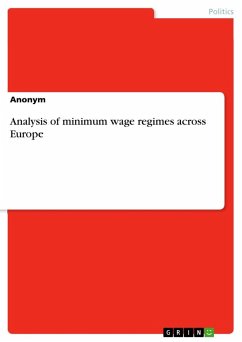
Is there a need for a European Minimum Wage?
Focusing on Great Britain and Germany
Versandkostenfrei!
Versandfertig in 6-10 Tagen
39,99 €
inkl. MwSt.

PAYBACK Punkte
20 °P sammeln!
25 years ago no one in Germany had thought that once Great Britain could become an economical role model. To that time, Great Britain was known as the sick man of Europe-high unemployment rate, high inflation and many strikes. But today situation is different - until a short time, Germany was the sick man of Europe. Even if today situation in both countries are better and seems to be stable, it is a fact that Germany and Great Britain - as well as all other European Member States - has to suffer under many exogenous and endogenous challenges. Existing systems need to be changed and to adapt to...
25 years ago no one in Germany had thought that once Great Britain could become an economical role model. To that time, Great Britain was known as the sick man of Europe-high unemployment rate, high inflation and many strikes. But today situation is different - until a short time, Germany was the sick man of Europe. Even if today situation in both countries are better and seems to be stable, it is a fact that Germany and Great Britain - as well as all other European Member States - has to suffer under many exogenous and endogenous challenges. Existing systems need to be changed and to adapt to new situations. This is a difficult task, which affects nearly every area. This paper will focus on the problems Welfare systems has to face, hereby focusing on employment and wage. Great Britain as a role model for national minimum wage and Germany as a country without a national minimum wage will be compared and it will be explained, how a European minimum wage could look like and which challenges countries have to face if such one exist.












